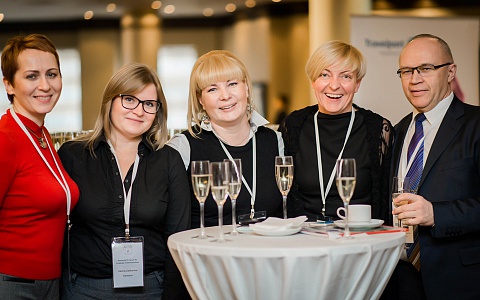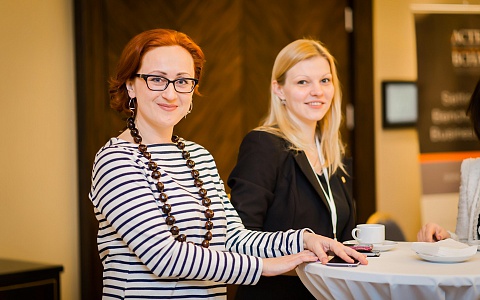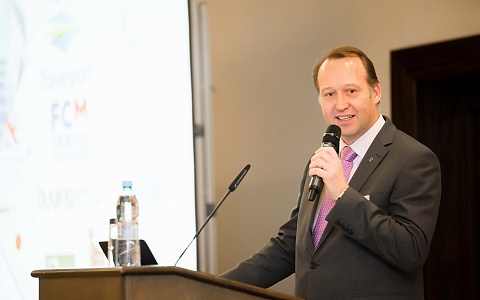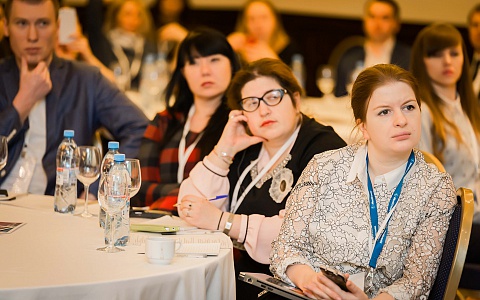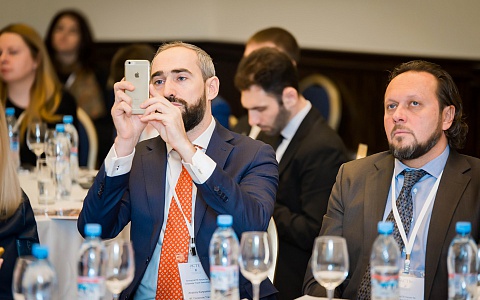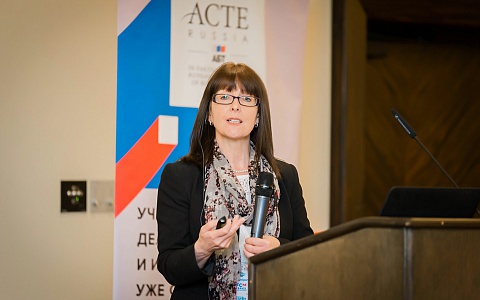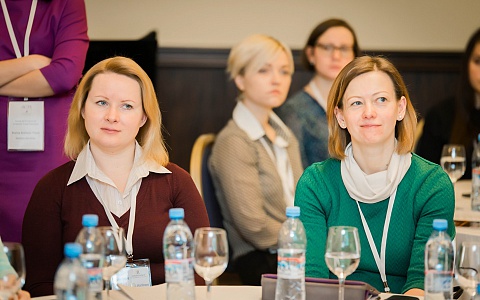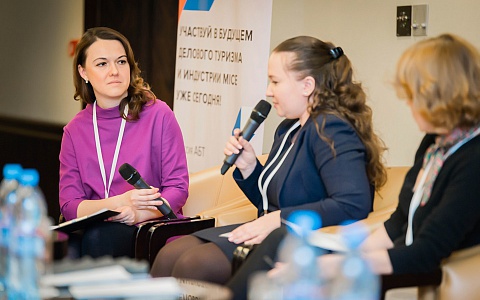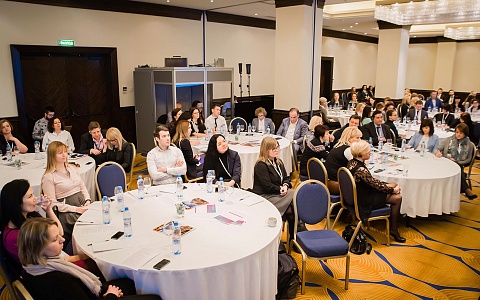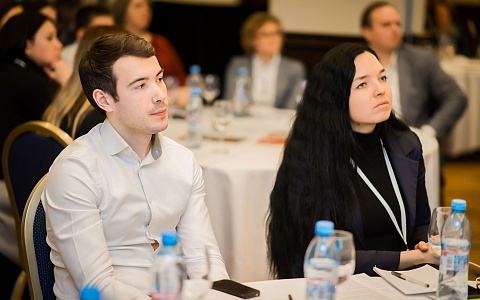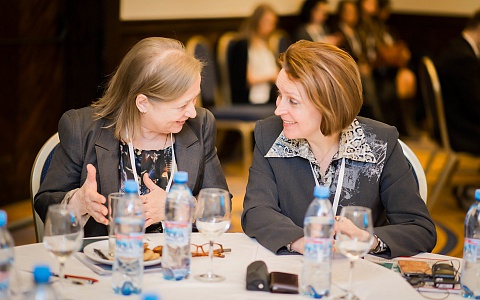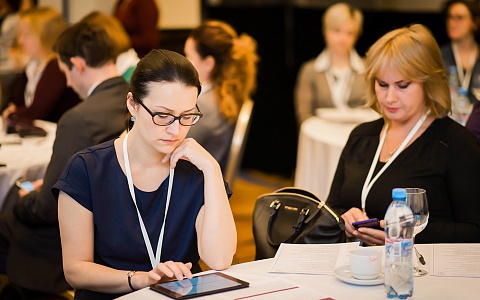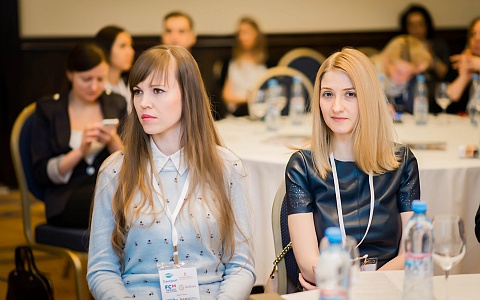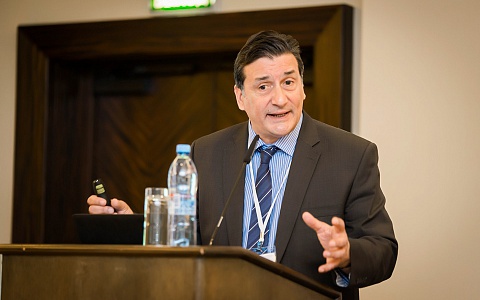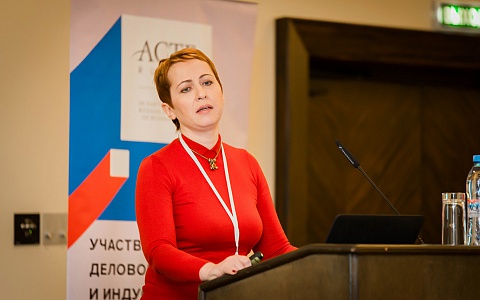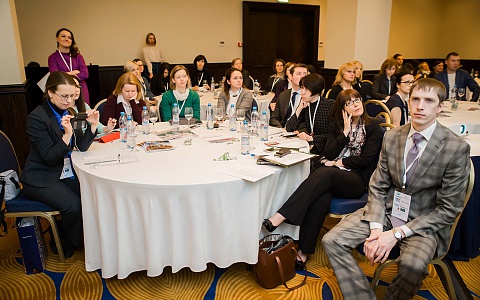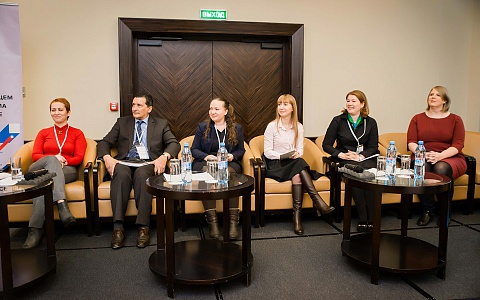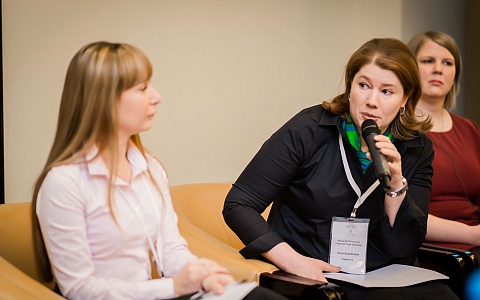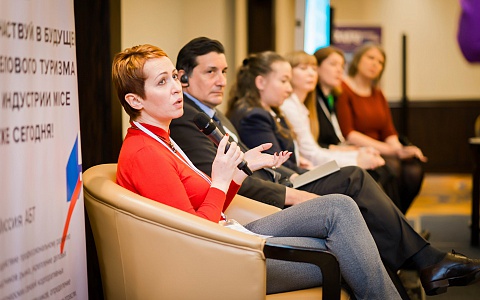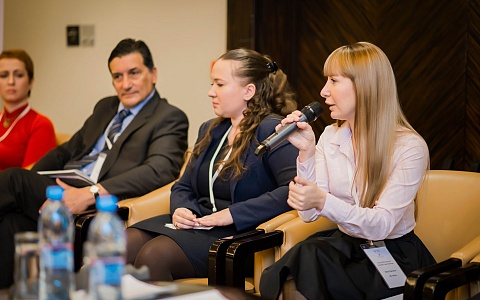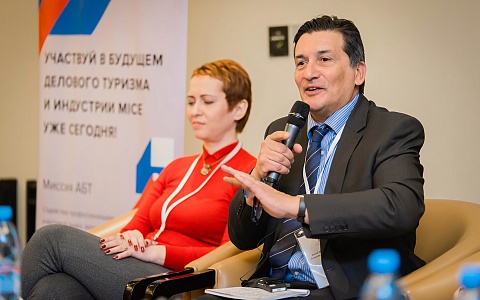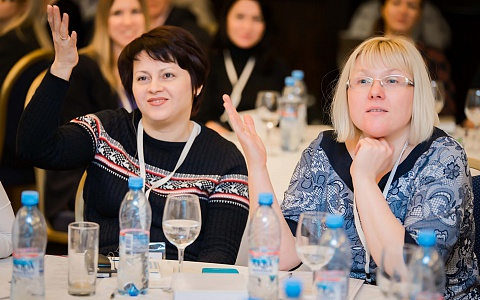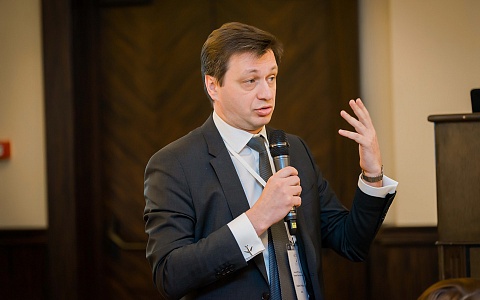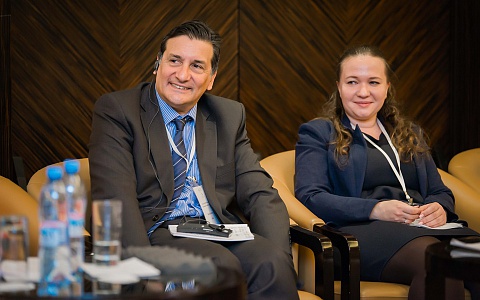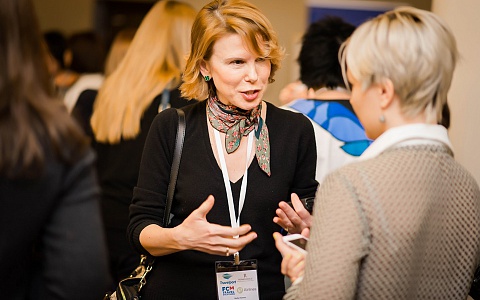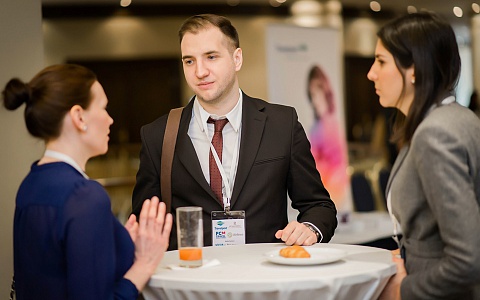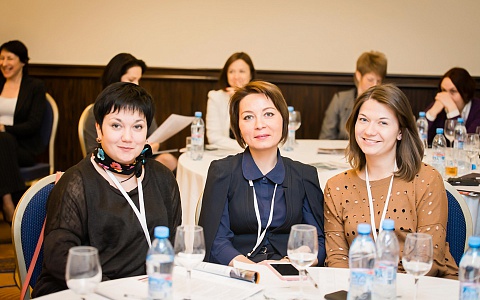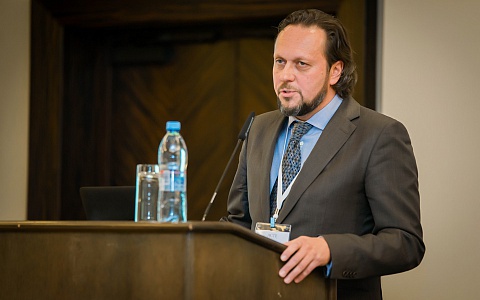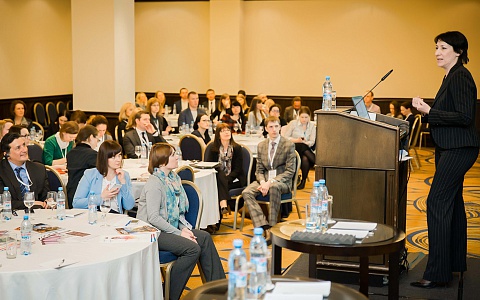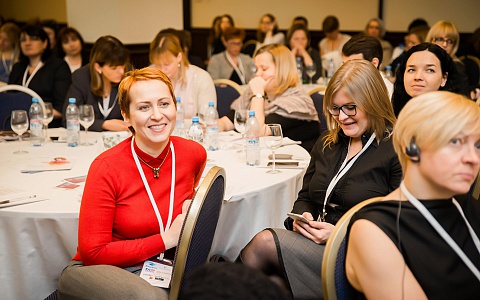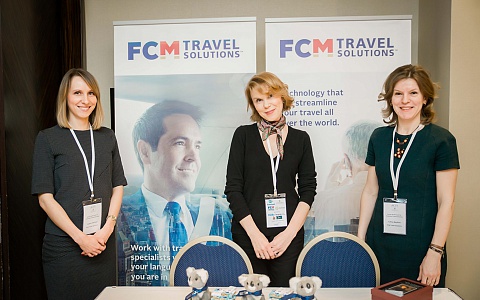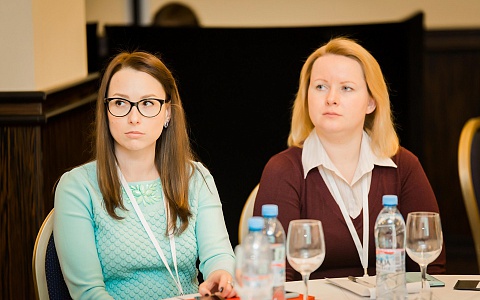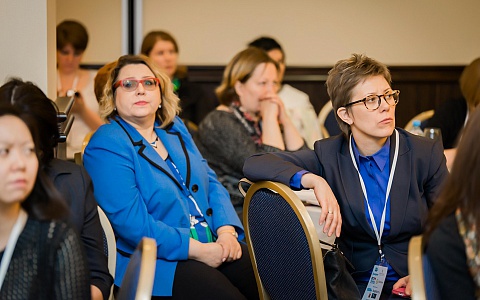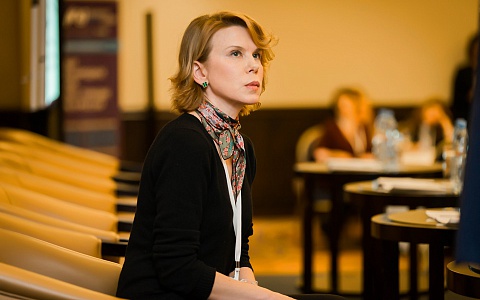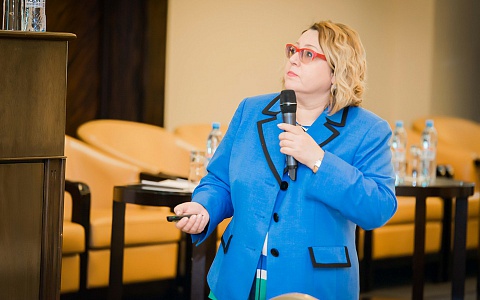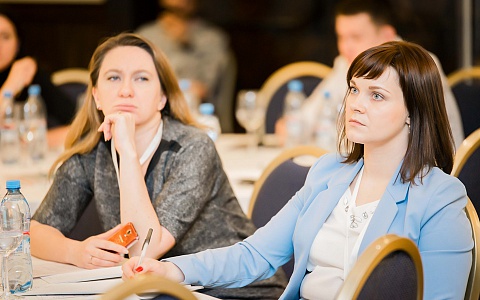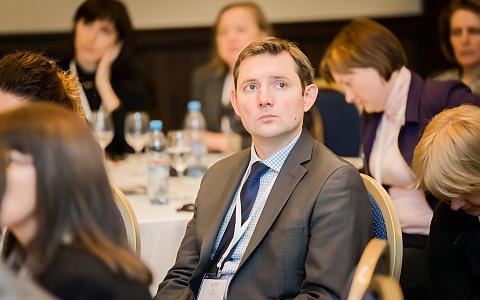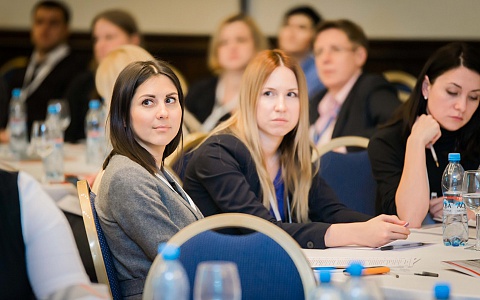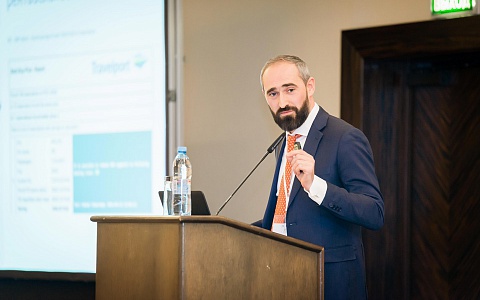ACTE Forum: future belongs to personalization
There were no vacant seats in the Georgievsky hall of Renaissance Moscow Monarch Centre on March 22 – an annual ACTE Forum for corporate travel executives was held there. Event participants discussed trends of the industry, spoke about milestone events of the previous year, gave their forecasts for the future, tried to puzzle out the revolutionary air service distribution standard, new technologies, cross-cultural differences and travel risk assessment.
The forum started from the review of global trends of the travel industry presented by Caroline Allen, regional director EMEA. According to the survey of the Association, 80% of corporate travel executives think that the focus will move back to service over economy in the next two years. The focus will be on the traveller. So travel managers will concentrate on involving employees into the program, on providing access to the right contents and tools for them. Now 72% of respondents take more effort to achieve the desired level of travel policy compliance. Soon the primary goal will be prediction of business travel behaviour.
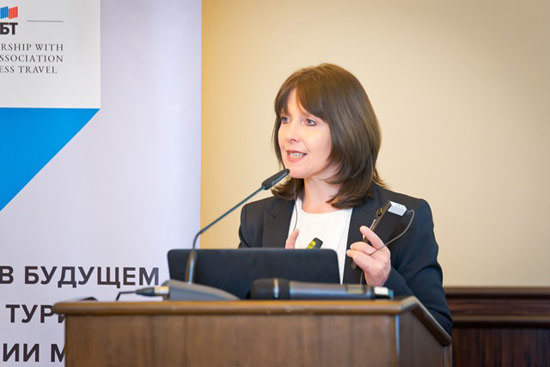
This is why the evolution of a travel manager`s role, whose responsibilities now include serious analysis, is now one of the main trends of 2016. Besides, this year corporate travel executives will pay closer attention to travel risk management and integration of business travel and meetings programs (SMM). And of course, the main driving forces of the industry are still technologies that facilitate travel personalization and will lead to the emergence of even more mobile applications and sharing economy services like Uber and Airbnb. By the way, 81% of respondent companies planned to start using them in the next two years.
Almost half of ACTE respondents (46%) admitted that the greatest challenges for the business travel industry participants were expected to appear in the field of technology in the next two years. And due their influence business travel management would change dramatically, was the persuasion of 79% of experts.
From the “stone age” to data exchange facilities
Do Russian corporate buyers and TMC representatives agree with their western colleagues in this respect? Chief editor of BBT Russia Svetlana Denikina suggested finding answers to this and other questions in an open interview devoted to technologies and innovations. Svetlana`s conversation partners were business travel project manager of Leroy Merlin Vostok Aleksandra Perekalskaya and executive director of FCm Travel Solutions Olga Belyusenko.
Thus, Leroy Merlin Vostok has been experiencing an active impact of technologies on travel processes for several years already. The company has been using an online booking system offered by its provider for three years. Besides, the company has started development of its internal platforms based on its own HR management programs.
“The world is becoming virtual, digital, mobile”, Olga Belyusenko said. “And the main thing for a TMCs is to keep up with the progress and the ability to adapt. Just imagine, as much as 20% of all the business trips in western countries are already booked with virtual single-use cards. We have also launched this technology. And we can admit that the number of transactions made with such solutions soars by 300 - 500% per month!”
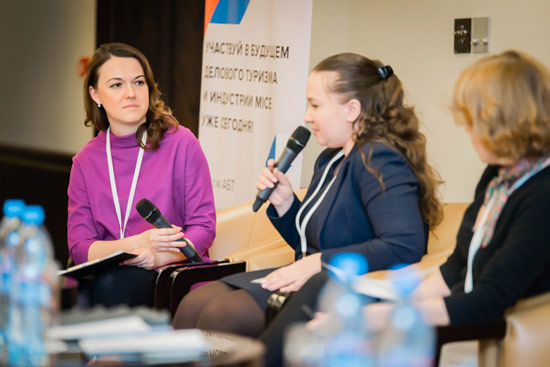
Despite the fact that agencies are the main online tool developers in the Russian market at the moment, Ms Belyusenko noted that nevertheless, TMCs would not grow into IT companies: “You cannot serve two gods at a time: we are either a service or an IT company”. Olga is convinced that new players will appear in the market in the near future and bring a new generation of solutions that will meet the trend of travel personalization and its integration with social networks.
Svetlana Denikina asked interview participants to name three travel technologies they considered the most in-demand and the most prospective for investment.
“As for us, yesterday, today and tomorrow an online tool of any generation has been the most needed. Second, our internal system of business trip planning that was developed even before OBT was introduced. And of course, smart phone applications, because in the context of our company`s rapid growth staff mobility is very important”, Ms Perekalskaya said.
On the contrary, Olga Belyusenko noted that online tools were not the most demanded technology with the customers of the agency, unfortunately. The first place is held by middle and back-up office and an opportunity to provide all the accounting documents that will be loaded automatically into the operational and accounting system of the company. “So, online tools are only number two”, Olga stressed. “The third are mobile technologies. And I would also name number four: we have a constant request for automation of the lowest fare search”.
“Now travel personalization and “one buyer market” are much spoken about. What do these terms mean to you? Are these just popular words or our reality? What technologies bring personalization into life?” Svetlana asked.
Ms Belyusenko stressed that technologies like this existed already, and their example was the introduction of the new communication standard, NDC. “Besides, Caroline was right to mention the “bleisure” trend in her speech: 25% of all the western business travellers combine a business trip with a small vacation. And we should take into account this request of employees and focus at traveller satisfaction”, the expert added.
Aleksandra Perekaskaya admitted that for her as a corporate buyer the notion of travel personalization was very narrow. “As for me, it is first of all convenience for business travellers. This is why we are developing a mobile application for smart phones and tablets, that will help the employee to appoint a business trip, ask for an advance payment, book all the services and then account for them by sending a photo of his documents through this application”.
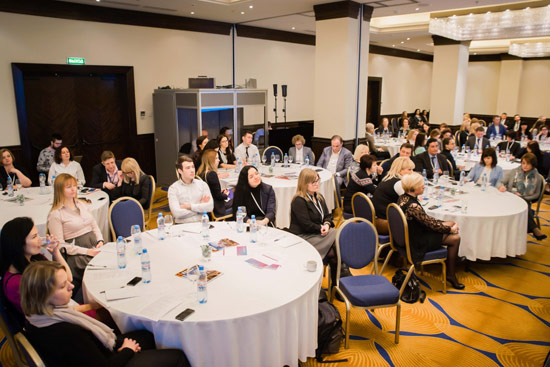
Svetlana Denikina reminded the participants that exactly two years ago there was an article on BBT website with comments of TMC representatives on whether mobile applications were needed by the market. And at that time all the industry representatives were unanimous that this technology was nice to have. Has the market situation changed since then?
Olga Belyusenko is convinced that mobile applications are already in the “must have” category nowadays. “By 2020 70% of the world`s population will have mobile phones. Besides, they are an important tool of staff safety provision for the companies”, the expert said. “A weather forecast and an online registration option of the application is a stone age already! Almost all the TMCs test new functions of mobile applications. And the focus will be on data exchange”.
A code library
David Rutnam, IATA regional NDC manager spoke about the new revolutionary data exchange standard in air ticket distribution system. At present there is a huge difference between what the agent sees when booking airline tickets through global distribution systems and information on the website of an air carrier, where the airline offers a detailed description of its product, extra services, for example, choice of seat, chauffeur seervice, wi-fi, as well as fully personalized offers. “You can find much more on an air carrier`s website than just a flight schedule and flight fares. It lets you choose and combine services according to your preferences”, the expert noted. “Besides, GDS facilities are constrained by the current architecture and an outdated technology: global distribution systems are not aware who buys the ticket till the transaction is complete. And consequently, they cannot form a personalized offer”.
Mr Rutnam stressed that NDC was not a system or a service, it was a new data transmission standard that used structures of the extensible markup language (XML). It is a way to include all the contents of the website of the airline into the platforms of travel agencies and third parties` systems, thus providing an opportunity to purchase additional services, to be recognized and to receive personalized offers or to keep anonymous, as you choose.
The expert named advantages that corporations would get from the introduction of the new communication standard by airlines: access to richer contents – to the necessary services with a good price, a considerable decrease in the number of bookings not meeting travel policy rules (which results in cost cutting), improvement of report quality due to the fact that ancillary costs are included.
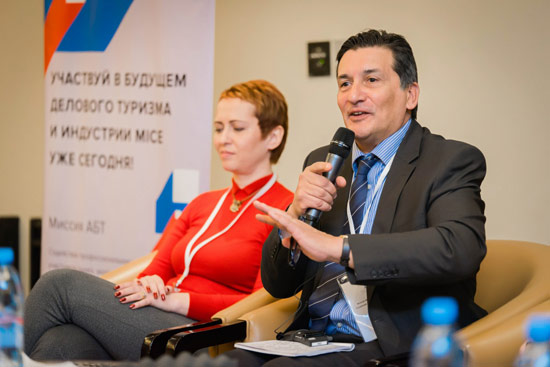
David said, that 15 out of the top 20 airline groups (by revenue) had either deployed NDC components or planned to do so within the next two years. IATA also takes effort to help both small and medium air carriers adopt the new standard.
The speaker stressed that GDS were already working on tools that could help airlines merchandise services available on their websites through travel agencies. IATA welcomes this initiative. “However, every global distribution system develops its own solution. NDC, on the contrary, will be a single open standard, available for anyone who wants to use it, including GDS that will stay travel agents` partners”, Mr Rutnam explained.
Senior commercial manager of Travelport Svetlana Pankova spoke about one of such products that helps synchronize data on the website of the airline with information on the screen of the agent. The expert stressed that Travelport already positioned itself not only as a GDS, but as a travel platform that helps its customers take another look at travel commerce experience.
“We support new solutions, and NDC is an important step in changing industry standards”, Ms Pankova noted. “It`s no secret that GDSs are still the main source of distribution income for airlines, but 87% of revenue from selling ancillaries is still brought by the websites of air carriers. Agents are often forced to interrupt their business processes, leave the system they work in, go to the website of the airline, search for the necessary service there and book it. It takes time. This is why 84% of agents want to sell extra services of air carriers in GDS”.
Due to Travelport Merchandising Platform airlines can show their contents in Travelport systems - Galileo, Apollo and Worldspan – in the way that is the most convenient for them.
The reason is that the system provides flexible connection – opportunity of distribution both according to ATPCO industry standards and through an XML protocol (API), or you can also use a combination of these two methods. The expert compared the XML protocol standard itself David also spoke about with a “code library”.
“In this platform the agent sees offers of both low cost and traditional air carriers. Besides, distribution of ancillaries of 67 airlines is integrated into the ordinary working processes of the agent, more than 50 services in 178 countries are also available and can be booked”, the speaker said. Thus, all the contents is “in one window”.
In the conditions of tougher competition it is vital for an airline to demonstrate the advantages the customer will get if he chooses its offer. Such an opportunity is provided for air carriers by Rich Content and Branding technology that is part of Travelport Merchandising Platform. Thus, agents now have access to the full description of the travel fare with all the extra services included into it, like on the website of the airline. More than 150 air carriers use this product. Russian air carriers include Aeroflot, contracts with S7 Airlines and Utair have been signed.
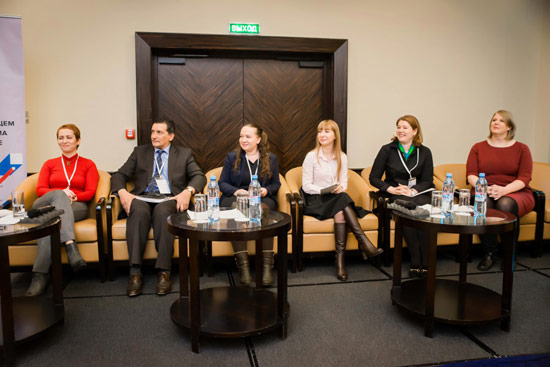
During the panel discussion, participants of which were representatives of all the parties (IATA, airlines, TMCs and corporate buyers) Ms Pankova stressed once again that NDC adoption does not imply refusal from global distribution systems: “Nowadays in order to promote its information in GDS the airline has to provide its API to us. It is like bricks – codes that differ for everyone. If now we build a house according to an individual project, if we start using NDC we will have some kind of a single standard. Yes, we will build panel houses. But it will be simpler, clearer and more efficient for the industry”.
Advantages of the adoption of the new communication standard by airlines are obvious for TMCs as well. “As for us, it will be an opportunity to broaden our service range and provide a fuller and higher quality service to our customers by reducing the time of agent`s work”, Anna Kuznetsova, managing partner of Vipservice stressed.
To what extent will the new distribution system use travellers` personal data? Does not NDC contradict to informational safety policy of most corporations?
It turned out that the participants of the discussion did not see any problem in it. “There are passenger profiles in GDSs, you can find them in middle offices of the agency as well. The matter is that we already work with personal data, we store and manage it according to all the latest requirements of the legislation and in compliance with the policy of corporate buyers”, Ms Kuznetsova explained.
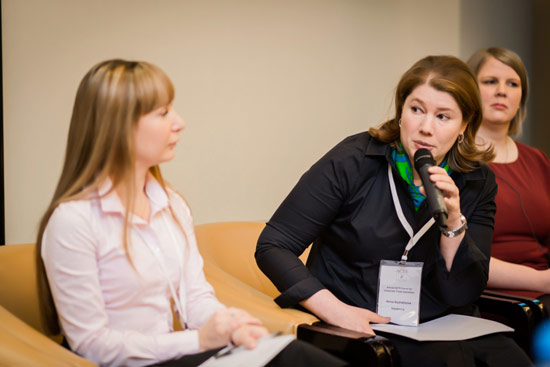
It is obvious that after NDC adoption employees who book services for their business trips themselves, will get a direct and quick access to extra services of airlines (like baggage registration, meals on board, choice of seat, class upgrade, etc.). In this connection Svetlana Denikina asked the participants whether they had concerns that it may lead to mass travel policy infringement and an increase in business travel costs, and what the ways to avoid it were.
“I think we will have to revise our travel policy, because we do not take into account extra services provided by air carriers at the moment”, is the opinion of Elena Danilova, travel manager of RN-Inform. “We will probably make a list of services that the traveller will have the right to book. The rest of the services will be at the employee`s expense. We will not lose the customized approach to the traveller, but the company will bear only a certain part of extra costs”.
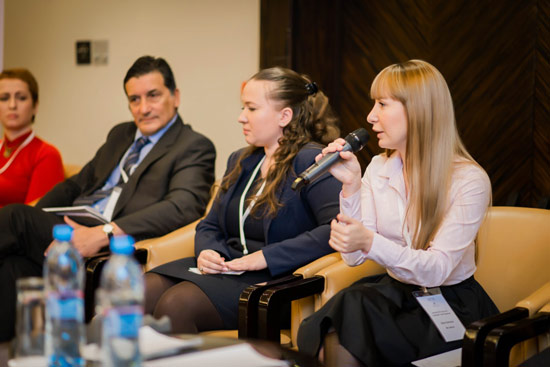
Will direct agreements with air carriers be affected after the new standard is introduced? It will always be easier and more reasonable for an employee to choose the lowest fare, and not the fare offered by one of “preferred providers”…
Aleksandra Perekalskaya is convinced that corporate buyers should not be afraid of it. “Who knows, maybe we will save even more in such a way?”, the expert supposed. General sales director of Lufthansa Silke Wobken agreed that you should not be limited to contracts with airlines only.
Besides, Anna Kuznetsova reminded the participants that there were settings in any SBT you could adjust, and there was no reason why companies could not limit access to any fares outside their corporate travel program.
All the experts who participated in the discussion considered NDC adoption to be a step forward and did not see any considerable risks for themselves connected with it. “It is a progress that we can see not only in our industry”, Elena Danilova said. “We can purchase a car in a base configuration or with a set of additional options. Another example is a bracelet popular with girls – when we take some type of a centerpiece and thread what we like onto it. It is a customized approach of the future”.
“I see many opportunities for personalization”, Silke said. “Several years ago we all had phones of different types, and now many of us have smart phones, tablets. We will adopt the new standard in the same way”.
“You will never see the NDC, but you will be able to see what the adoption of the new communication standard can do”, David summed up. But when will we be able to probe NDC facilities in Russia? “You should take into account special aspects of our market, where more than 90% of air traffic is local”, Anna Kuznetsova noted. “We will be able to speak about NDC in this country only when Russian air carriers adopt the new standard of data exchange”.
At the moment only one of all the Russian airlines, S7 Airlines, is testing the NDC. “Air carriers understand the importance of agents and corporate buyers perfectly well and want to join the project. But it is very expensive for airlines to adopt the new communication standard, especially as the times are tough nowadays”, head of passenger traffic programs of IATA in Russia Vladimir Proskurin gave his explanation. “This is why it is hard to say yet how quickly it is going to happen. All this is available already, but in individual solutions. IATA is standardizing the process. It is easier to speak the same language, English, than 200 different ones. Let us find one common language and come to an agreement!”
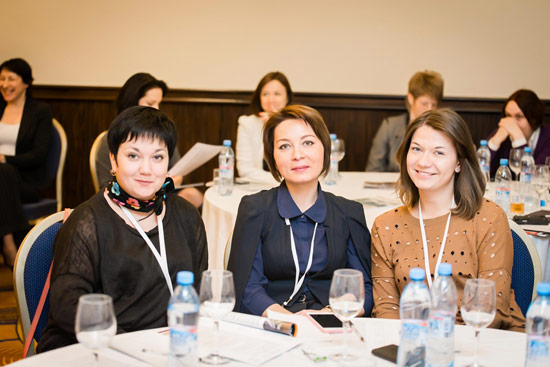
Past and future
The second session of ACTE forum started from the review of 2015 events and a forecast for 2016. Thus, Anna Kuznetsova reminded the participants that the previous year was officially declared a recession. Companies had to cut their staff, and travel managers – business travel costs. The drop in the business travel market amounted to 20-30%.
The shut-down of such destinations as Turkey and Egypt seriously affected the demand for Russian domestic MICE venues. But as the expert noted, we did not get a well-developed infrastructure for large-scale events in Russia, the same can`t be said for the rise in prices for MICE in the regions. “Unfortunately, it is not economically feasible to hold events in Russia nowadays. In order to meet the demand and the needs of corporate buyers we need at least ten destinations like Sochi”, Ms Kuznetsova expressed her opinion.
As a spontaneous questionnaire of corporate buyers who attended the event showed, neither the bankruptcy of Transaero, nor the introduction of a 16 euro fee for ticket booking in GDS by Lufthansa`s, nor the new rules of Schengen visa issue, nor revocation of direct acquiring of card payment through GDS by Aeroflot has caused serious problems. Only a few companies admitted they had suffered from these widely discussed changes.
It also turned out that the corporate segment had not felt the positive economic effect from the government`s initiative on decreasing the VAT for domestic flights from 18% to 10% in order to restrict fare growth. The participants of the forum admitted that VAT was not a costs item for companies, and a decrease in this tax had become a bonus for individual travellers only. But TMCs were struck with “technical horror” because they had to change their documentation. There was also no notable economy from the new government regulation of October 21, 2015 on the changes in payment for early check-in and late check-out.
But the last year had brought positive events as well, was the opinion of Anna Kuznetsova. The changes in the agent commission of Russian air carriers had a positive effect on the industry in the end. "Tenders held at the end of the last year and in the first quarter of 2016 no longer had zero profitability", the speaker said.
Besides, because of the financial crisis TMCs have become undesirable customers for all the banks, which resulted in their limited access to credit resources. Due to this agencies have been forced to reduce the credit period for their customers lately.
"And of course, the crisis has greatly encouraged technological growth. Both customers and TMCs and software developers approached 2015 with some online solutions. And put them into operation at once. So the challenge for 2016 will be to find the way to connect all them somehow", Ms Kuznetsova said.
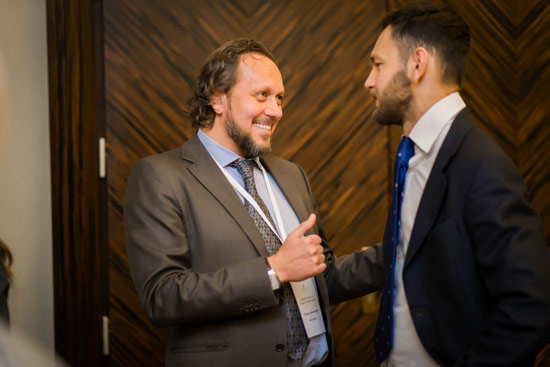
General director of HRG Russia Philip Lookianenko is convinced that there are objective reasons for the fact that 2016 will be hard. "Last year our corporate buyers cut the number of business trips by 5-10%. And over the year we observed a decrease in the average accommodation rate of Russian hotels and a considerable growth of accommodation costs abroad because of the ruble rate drop. And the result of it was the reduction in the length of foreign business trips", the expert noted.
The Russian market is shrinking, and it has made a number of foreign airlines leave the market and the rest left cut the flight frequency. Mr Lookianenko did not forget to mention about the introduction of the new fare concept by some air carriers. "We used to buy tickets following the Turkish “all inclusive” model, and now the price of the ticket depends on the amount of services included. And it is good, because the airline offers you only the services you need".
According to statistics of HRG Russia, the average price of domestic flights has changed only slightly for the past four years (it does not fall outside the range of 11-13 thousand rubles). The same can`t be said for an average ticket price for international destinations: thus, in 2015 its average value was 29 thousand rubles, in 2014 - 24 thousand.
"Fitch forecast for the Russian economy is still not very positive. Experts predict a GDP drop by 2,5% in 2016 and a high volatility of the ruble rate due to low oil prices", Philip noted. "We see and expect a more cautious and forward looking approach to travel management from our customers. At the same time the share of online booking will continue to grow. We will experience an increase in travel costs due to the introduction of the new fare structure. And we will no doubt expect a price rise for Russian hotels - by 20% in large cities, in Sochi and the Crimea - by 30%".
From the speaker`s point of view, the main challenge has always been and still is the opportunity to search and to book a ticket with the most economic fare. And it is an interesting challenge both for TMCs and for travel managers.
An exceptional case
When you communicate with representatives of different countries, it is important to be able to prevent cross-cultural conflicts and to use cultural differences as a means of capitalization. What should you be aware of? What should you know? And what should you do? Vera Bunina, teacher of Moscow State University Business School, Ph. D., associate professor, Master of information and communication of Paris-1 Pantheon-Sorbonne University spoke about cross-cultural competences in communication during a business trip.
If foreign partners tell you after the meeting they have wasted their time, you should understand that it is the most serious reproach you can ever hear from them! Because in Europe and the USA time is highly valued as a non-renewable resource (unlike money). And in the Islamic world, as the expert said, money and joint liability go first. And any kind of agreement on the price is an act of cooperation.
At the same time, for people living in the Far East and the Asia-Pacific region the main thing is the notion of "guanxi", i.e. acquaintance and the old boy network, that are raised to the rank of law. "Mutual obligations play a huge role in the East. Here you always keep in mind who owes what to whom", the expert explained. "Besides, the role of the word is also important here, especially of a witnessed one, and it is even better if it is proved with a photo where you shake hands".
By the word, western cultures are written ones, so any verbal arrangement is a mere name here, unless it is proved in a written form.
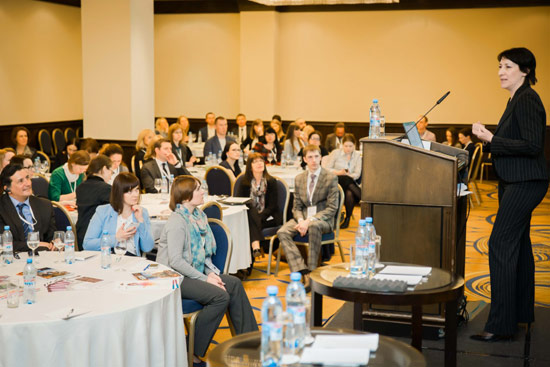
The expert also spoke about the ways your knowledge of cultural aspects could help you change the decision of your foreign partners. For example, in individualized western countries the role of principle is very important. To sacrifice one`s principles is a very painful process for a western person. "Ask to change the decision on an exceptional basis. You can use this rule even if you have visa problems", Ms Bunina recommended.
At the same time for an eastern person the most horrible thing is to lose face in the eyes of his fellow countrymen. So the fear that his mistake may be known to the public may be used as a tool as well.
If you make a proposal to a representative of the Islamic culture, you should not forget that religious laws are very important for them, as well as such notions as "halal" and "haraam", i.e. what is good for a person and for the society, and what is bad. "Besides, in Muslim countries the family is the only place where a woman can show her worth. So if you are a business woman, ask a man to accompany you, or you will not be taken seriously", the expert added.
Vera also gave the participants some advice that included "to apologize, smile and give presents". But you should remember that all the cultures do it differently.
Safety under control
The third session was devoted to the issues of staff safety during the business trip. Unfortunately, the importance of this problem was proved by the tragic events that took place on the day of the forum: the attacks in Brussels airport and Maalbeek station of Brussels metro.
"The world is a scary place, indeed. And it is getting more and more dangerous", executive director of FCm Travel Solutions Russia Olga Belusenko said. "Nevertheless, the number of travellers will grow".
The expert reminded the participants that only in 2015 there were six thousand travel incidents, which is 13% more than in 2014. They included terrorist attacks in Paris, A321 plane crash in Sinai, as well as an earthquake in Nepal that claimed the lives of 8699 people. Strikes, viruses, a flood of refugees that results in blocking transport facilities - all this affects business travel as well. Data provision in terms of duty of care is the most demanded in FCm at the moment", Olga noted.
Ms Belusenko devoted her speech to practical solutions in travel risk management (TRM), that should be in every company. The key component of TRM is risk assessment. You should make a black list of airlines and types of aircraft that get into all kinds of incidents the most frequently. The speaker advised to obtain statistics on air carrier reliability and aircraft safety on special websites, for example JACDEC. This information is to be paid for, but it is absolutely necessary.
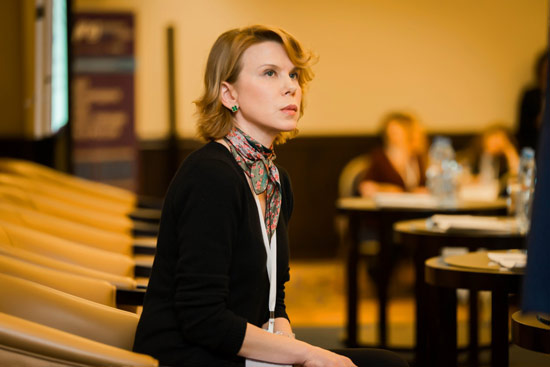
Olga demonstrated how this data could be used to build a risk assessment matrix that included a red, a yellow and a green zone into which airlines and types of aircraft fall. The green, safe zone does not imply business trip confirmation, the yellow one requires a special approval, and the red one makes the business trip impossible. "But there are situations when only the AN prohibited by the matrix goes to the destination. In these cases you should have special control over these travellers", the expert explained.
The risk countries map should be made according to the same principle. "You should assess two types of risks. We understand that Brussels will be in the red zone today. But historically this territory has never been in the high risk zone", Olga explained.
Besides, it is necessary to introduce restrictions on the number of employees on one flight, as well as regular communication - travel alerts. There are companies that provide professional TRM services and know what to do in case of emergency - say, they can send their plane and evacuate the staff. According to Ms Belusenko, the best services of this type are iJet and iSOS. She also stressed that the right approach foresees full data exchange between the agency and the TRM company.

How to trace your employees during their business trip? The information on their location can be obtained in several ways that should be combined. "According to the survey, 71% of customers get this information from us and GDS. I was surprised to learn that 30% use credit card data. But there is no guarantee that the last payment with this very card was made in the location where the traveller is supposed to be", Olga said.
In her words, the GPS technology connected with mobile applications has been on the rise lately. It lets you react in the online mode, prove your location quickly, limit the region the employee should be in. At the same time 94% of travellers are ready to be traced, if they go to high risk regions".
Then Ms Belusenko passed the floor to the customer – the representative of safety service of General Electric, the leading company in the field of duty of care. Roman Vladimirov spoke about the ways employee safety processes are organized in their company, and about integration of GE Travel Advisory System (TAS).
The topic of safety was continued by Aleksey Ageev, head of corporate department of S7 Airlines. He said that the fleet of S7 Airlines was one of the youngest in the Russian air travel market. The average age of aircraft is 9 years. The main part of the fleet consists of Airbus A320 planes.
Aleksey spoke about the safety and quality policy of the company. "In order to achieve maximum competency of aviation personnel, S7 Training was established - the largest aviation training center in Russia, CIS and Eastern Europe, where the full training cycle for cabin and flight crew is provided", Mr Ageev said. "In the centre they receive qualified training in theory and emergency situations, simulator-based training, distant training is available as well". Besides, you may go on an excursion there and try yourself as a pilot.
On the rise
The final fourth session started with the speech of administrative director of JTI Marina Krechetnikova, who spoke about preparation to OBT introduction. "We have called our project a "Bird", because we perceive it as some kind of a take-off from the online platform", the speaker expressed her opinion. She said that adoption of the online tool was expected to help the company achieve better travel policy compliance and conformity with procedures in 87 markets, better transparency, an opportunity to trace the situation online and an increase in personal responsibility of every employee for the expenses he incurs.
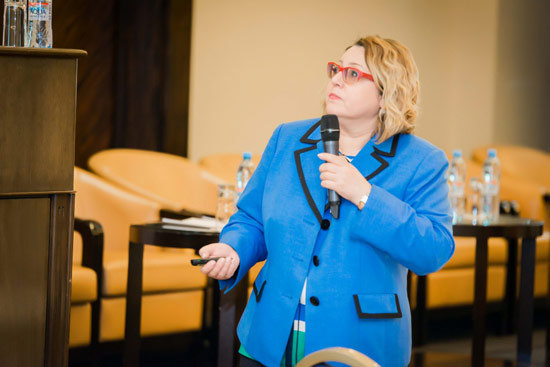
Before the start of the project, JTI assessed the number of TMCs that worked with their offices all over the world, the way they arranged the traveller support process - with the help of online or offline instruments. A comparison to some other companies in the market was made, information on the average cost of transaction through the TMC for these corporations was obtained (25-35 dollars, which is much less than that of JTI). "Besides, we came to the conclusion that automated report management resulted in considerable economy, because it cost from 5 to 15 dollars, while manual management cost from 25 to 75 dollars", Ms Krechetnikova noted.
Thus, JTI representatives came to the conclusion that it was optimum for the company to cooperate with only a few TMCs all over the world, which will work with one OBT engine. It will provide a single approach. As the result of the tender the Concur module was selected, and the task of the agencies was to adjust their processes to it. "As the result we will have a single OBT, a single expense tool - that is all the business trip reports will fall within the same regulations. We will also work with corporate credit cards and try to decrease the number of bank transfers, which will improve our reports as well", Marina said. "We think that after this project is completed, all the processes will be managed 28% quicker, travel policy compliance will improve by 44% and we will cut the cost of transaction by 54%. And we hope that this project will lead to economy not only for our company, but it will also help TMCs in their hard times to cut their costs as well and make their work more efficient".
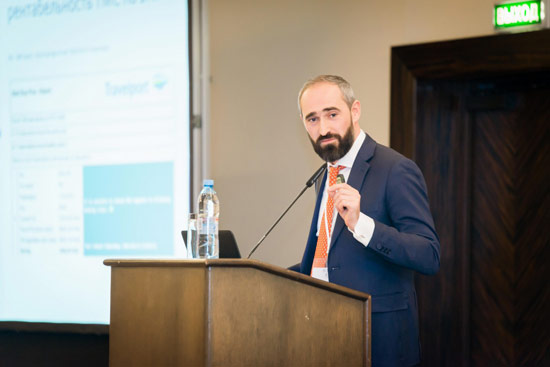
The fact that the right use of OBT increases profitability of the agency was practically proved by the general director of IBC Corporate Travel Anatoly Kuryumov. The contents of the "Rocket", which is the name of the online tool of the TMC, was the global distribution system Travelport (Galileo).
"As the result of this partnership we managed to offer the lowest fares available in the market through the OBT. What is more, their share reached 87%. It means that we spend fewer working assets per transaction. Consequently, the service fee is more cost-efficient. It is unbelievable - we have saved the customer`s money and increased our own efficiency!", Mr Kuryumov said.
Cost-efficiency of the agency was also increased due to Travelport Best Buy Plus. "We book a flight for you, and then a robot goes through all the tickets sold and checks whether there are cheaper options for these flights, calculating economic feasibility of re-booking. In case of successful search it sends a notification to the agent", the expert explained. "Economy resulting from these two platforms we have included into our OBT achieves 100 thousand rubles per month".
Despite the fact that the program was planned for the whole working day, the participants did not hurry to leave the event and continued discussion during the closing cocktail. "Everything was interesting at today`s forum, because experts spoke about absolutely new products and solutions. No doubt, I will look through my notes carefully once again, study presentations more thoroughly and will probably introduce something in our company", Irina Bodrova, head of administrative department of RTSoft said.
Natalia Travova
